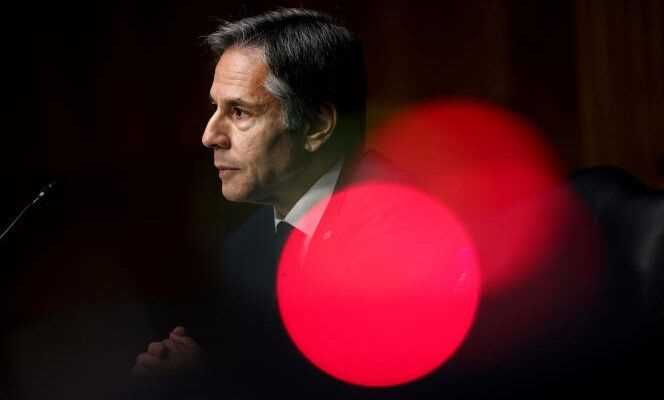The US Secretary of State, Anthony Blinken, begins in Nairobi, Tuesday evening November 16, his first trip to sub-Saharan Africa since taking office. A displacement centered on democracy and climate change, but the crises in Ethiopia and Sudan should put security back on the menu.
The US foreign minister has the ambition to set the Biden administration apart from that of his predecessor, Donald Trump, who made no secret of his lack of interest in Africa and was the only president in several decades not to surrender on the continent. Mr. Blinken will visit until Saturday three countries considered key in the African strategy of President Joe Biden: first Kenya, one of Washington’s oldest allies, but where China is gaining ground; then Nigeria, the most populous country on the continent; and finally Senegal, a model of democratic stability.
Sub-Saharan Africa is the last region of the world Mr Blinken visits, whose travel during his first months in office has been hampered by the Covid-19 pandemic and the US withdrawal from Afghanistan. His visit takes place less than a month from a virtual summit “For democracy” organized by Joe Biden and in the wake of the COP26 climate conference, during which Washington joined calls to abandon fossil fuels.
With regard to Africa, “The current approach emphasizes the objective of revitalizing democracies as well as climate change and sustainable development”, explains Ervin Massinga, senior official at the State Department. According to him, Blinken will also discuss the development of production capacity in Africa of Covid-19 vaccines, an initiative through which Mr. Biden hopes to distinguish himself from China, which offensively puts forward its own vaccines.
Suspension of aid to Sudan
In the background will nevertheless appear the crises in which Washington is diplomatically active, affecting two countries in which the United States for a time placed a lot of hope: Ethiopia and Sudan.
Addis Ababa was for a long time a close ally of Washington, now dismayed by the obstacles to the delivery of food aid in the northern region of Tigray, the scene of a conflict between the federal army and the rebels, where famine threatens hundreds. thousands of people. The Tigray People’s Liberation Front (TPLF), against which the government of Prime Minister Abiy Ahmed launched the federal army a little over a year ago, has reconquered Tigray, advanced in neighboring regions and threatened henceforth to march on Addis Ababa.
“This is not the Ethiopia we thought we were seeing two years ago, when we applauded it as Africa’s most dynamic economy”, recently underlined the American Ambassador to the UN, Linda Thomas-Greenfield. Joe Biden recently said he was prepared to deprive Ethiopia of the benefits of the U.S. Africa Growth and Opportunity Act (AGOA), which exempts many African countries from tariffs. He has so far ruled out sanctions on the Ethiopian government or the rebels, hoping to encourage a political settlement.
At the same time, the United States suspended some 700 million dollars (about 610 million euros) in aid to Sudan, the scene at the end of October of a military coup that put a halt to the democratic transition. started with the overthrow in 2019 of the autocrat Omar al-Bashir after thirty years in power.
Risk of a “regional collapse”
Former senior diplomat in charge of Africa under former Secretary of State Hillary Clinton, Johnnie Carson believes that Mr. Blinken’s visit to Kenya should not be “A missed opportunity” invite the leaders of the surrounding countries to seek a regional solution to the Sudanese and Ethiopian crises. “The Horn of Africa is extremely fragile and the democratic transitions that we thought would go ahead in Ethiopia and Sudan have been derailed”, explains Mr. Carson, now at the American Institute for Peace (USIP). “In fact, if these countries collapse in the coming year, we will see a larger regional collapse”, he warns.
Mr Blinken is expected to have sensitive talks in Nigeria, to which the United States has suspended delivery of helicopters due to concerns over human rights. Another subject that should be addressed during his trip: trade. The AGOA expires in 2025 and, like Mr. Trump, Mr. Biden does not seem in a hurry to replace it, in the face of an American opinion less and less favorable to trade agreements, at the risk of favoring trade relations between Africa. and China.
To not miss anything on African news, subscribe to the newsletter of World Africa from this link. Every Saturday at 6 a.m., find a week of current events and debates treated by the editorial staff of World Africa.
